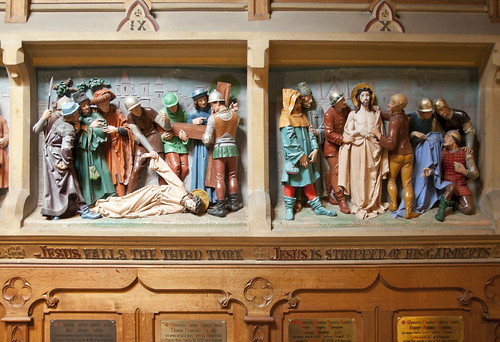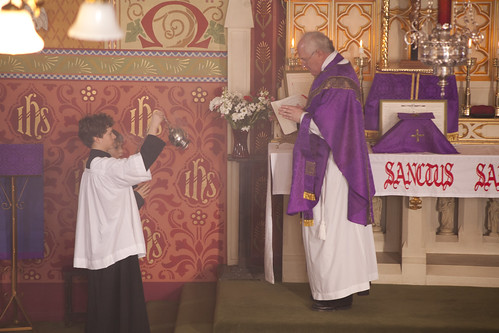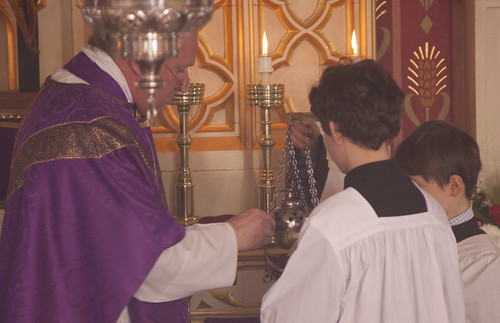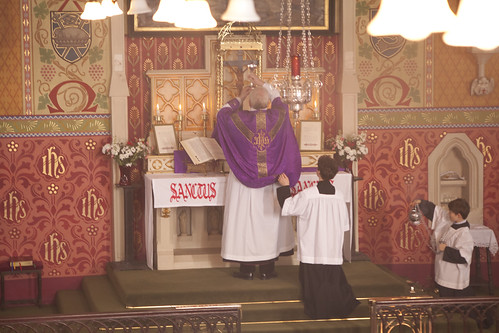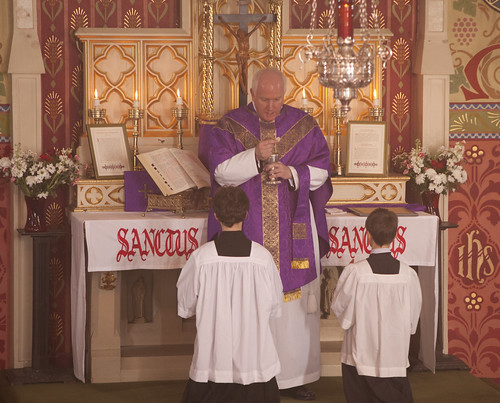Chairman's Blog
Call for Masses for Ireland's referendum
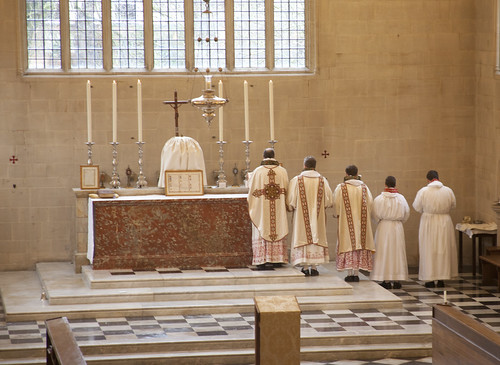 |
| A Dominican Rite High Mass in the Priory of the Holy Spirit (Blackfriars), Oxford |
Latin Mass / Una Voce groups throughout Britain and Ireland call for Masses to be offered for the Irish abortion referendum
Many readers will have heard of the attack on the unborn currently being planned in Ireland. The background is that in 1983, in the context of fears that Ireland’s historic legal protection of the unborn would be undermined by the courts, the Irish voted to amend their constitution—the Eighth Amendment—as follows:
The State acknowledges the right to life of the unborn and, with due regard to the equal right to life of the mother, guarantees in its laws to respect, and, as far as practicable, by its laws to defend and vindicate that right.
A referendum is now being planned to abolish this amendment. This will take place in late May or early June.
Ireland’s protection of the unborn is of special significance because it is unique in Europe, and among ‘developed’ countries in general. It is therefore a test case for the argument, so often made, that abortion is necessary for the safety of mothers. In fact Ireland has one of the best records for maternal mortality in the world, a fact deeply embarrassing to the abortion industry. Abortion is not necessary for the protection of women’s health, but indeed is a direct attack on it.
In response to this threat, four affiliates of the Una Voce Federation in the British Isles have come together to appeal for Masses to be said for this intention. Ireland has two national associations: the older Latin Mass Society of Ireland, and the more recently founded Una Voce Ireland. They are joined by Una Voce Scotland, and the Latin Mass Society of England and Wales.
The act of abortion, the direct killing of an innocent person, is never permissible. Many pro-life groups are engaged in valiant campaigns to educate people on the reality of abortion and its effects. The role of God’s grace is recognised too in the prayer campaigns which have commenced. What better way to implore God’s grace than to offer the ultimate prayer, the Mass, in its most worthy form – to implore Almighty God to enlighten Irish citizens so that we better understand and fight this evil, which not only kills the bodies of our unborn brethren, but deprives their souls of baptism, the gateway to spiritual life (vitae spiritualis ianua)? (Catechism of the Catholic Church 1213, quoting the Council of Florence).
The significance of this referendum is world-wide. Over many decades, Ireland has demonstrated that a developed nation can protect the unborn and mothers at the same time, with one of the best records for maternal mortality in the world, giving the lie to the claim that access to abortion is necessary for the protection of women.
This is an issue which is close to hearts of our members and supporters, who are well represented in the Pro-Life movement.
It behoves us as Catholics to pray and offer Masses to protect our brothers and sisters in Ireland.
Masses to be offered for this intention include the Latin Mass Society of England and Wales’ annual Pilgrimage to Our Lady of Caversham, in Reading, on Saturday 24th February, and its annual Pilgrimage to Preston on Saturday 5th May.
The Dominicans of Holy Cross, Leicester, will be offering a Novena of Masses for this intention culminating on the Feast of St Joseph, Spouse of the Blessed Virgin Mary, on 19th March.
We hope readers will feel inspired to add their own Masses, prayers, and sacrifices for this important intention.
Support the work of the LMS by becoming an 'Anniversary Supporter'.
Support the polyphony database today!
Today is the last day of a Crowdfunder initiative to support a project to digitise a huge database of early Sacred Polyphony, to be provided free for scholars and musicians. Not only is it worthy of support, but the 'benefits' you can claim for donations are fantastic!
Some details below. Go to the Crowdfunder page.
What is the Polyphony Database?
- To assist performers, directors, and editors by cataloguing the contents of primary sources, source concordances, and basic information about how each piece of music can be performed.
- To provide a reliable starting point for academic research by linking to library catalogues, other existing databases, and facsimile images of early music manuscripts and prints.
- To provide a repository for properly sourced critical editions, performing scores, and recordings of as much of this music as possible, each carefully vetted for typesetting quality and accuracy, and made available for free download, so that this music might be discovered and appreciated by a wider audience.
Support the work of the LMS by becoming an 'Anniversary Supporter'.
Ten Weeks in Africa: review
The stories about Oxfam and Unicef stimulate me to repost this, from October 2012. The book I'm talking about is more prescient than I realised. Buy the book here.
----------------------------------------
Ten Weeks in Africa by JM Shaw (my brother) has been reviewed by Charles Moore. Read the review here.
The novel has turned out to extremely topical, with a series of stories appearing about how aid is misspent. Here's Charles Moore:
But the point to understand about international development, at least as it is usually conducted between modern states, is that it cannot achieve its intended results. Just now, this paper’s Sunday sister has been running some splendid stories of aid money wasted on tourist projects and overpaid consultants; much of it is commandeered by the European Union for unworthy causes. It is good to expose such things. But this novel looks at the question even more radically.
People often say that if only more were done to “get rid of corruption” then aid would be wonderful. What they miss is that aid is the greatest stimulant to corruption offered by rich countries to poor ones. It is an uncovenanted, and often unaudited, blessing for those who already have power, and therefore — because the recipient countries are kleptocracies — a curse for the people they rule.
The point is that aid, rather like diamonds or oil wealth, isn't just spoilt by corruption, it creates and sustains corruption. It also creates and sustains famine and war. Which isn't to say that it can and does do good. But there isn't a sharp contrast between 'good' aid and 'bad' aid: aid does bad, sometimes, because it does good: because people benefit from it, say in a refugee camp, people can leave their homes to go it. Again, it can do good, sometimes, because it is addressing a bad situation which it has created: having created a dependency, yes indeed the people really do need it to survive.
As I read the book I wondered about how people in these desperate situations can really be helped, and how the saints of the past, and present, in the Church, have gone about it. How did St Francis, or the Jesuits in the 17th Century, or Mother Theresa, do it? Part of the answer is the solidarity with the poor which they exemplified. They didn't swank about in Toyota Landcruisers and live in air-conditioned hotels, and throw handfuls of bank-notes to the beggars - or the equivalent. They became poor themselves to help the poor. Instead of representing an opportunity for graft, kidnapping, theft, corruption, and fraud, by coming into a situation with resources beyond the dreams of anyone they met, they addressed the poor personally, by service. They came to understand their needs, and yes of course they took money from donors and spent it on useful things like orphanages, but that was not the whole of what they were about, and when they did it they did it on the basis of a real knowledge of the people they were helping, and how they could be helped. And they didn't leave after three months to move on to another prestigious project, leaving everything they had done to be destroyed. If necessary they stayed with their adopted people and faced death from wars and persecutors. This is something, of course, which consecrated religious can do more easily than married people with children to think about.
Oh yes the aid workers the West sends out are very generous with their time and effort, and they really care about the people they want to help. But if they fail it is partly because they are giving their time, but not themselves.
Prayers for Persecuted Christians
 |
| The Arabic letter 'Nun', for Nazarene, is being painted on Christian homes in Mosul, to mark them out. |
I posted this in July 2014 for the Christians of the Middle East. Today I repost it with the thought particularly of the Catholics of China.
--------------------------------------------------
At this moment of disaster for the Christians of Mosul, and of the Middle East in general, we should remember to keep them in our prayers, and have Masses said for them.
There are several Votive Masses and Commemorations in the 1962 Missal for suitable intentions ('For the Church', 'Against Persecutors', 'For Peace' and the like). The Collect of one of them was enriched with an indulgence in 1934, for use as a prayer on its own. The indulgence has gone but we can still say the prayer.
Graciously hear the prayers of Thy Church, we beseech Thee, O Lord: that her enemies and all heresies be brought to nought, and that she may serve Thee in perfect security and freedom. Through Christ our Lord. Amen.
Ecclesiae tuae, quaesumus, Domine, preces placatus admitte: ut, destructis adversitatibus er erroribus universis, secura tibi serviat libertate. Per Christum Dominium nostrum. Amen.
(Translation from the Raccolta, the official handbook of indulgenced prayers.)
The Raccolta also includes this short prayer, taken from the Roman Ritual:
That Thou wouldst vouchsafe to bring low the enemies of holy Church, we beseech Thee to hear us.
Ut inimicos sanctae Ecclesiae humiliare digneris, te rogamus, audi nos.
A longer prayer, which isn't in my edition of the Raccolta but which was also granted an indulgence in 1934, was issued as a Prayer Card by the Catholic Truth Society with an imprimatur from Cardinal Godfrey in 1962.
Almighty, everlasting God, look with compassion on all those who suffer persecution for justice’ sake.
Grant them grace to carry their cross with patience in the name of Thy beloved Son, our Lord and Saviour Jesus Christ.
Let the chalice pass from them is such by Thy holy Will: yet, in all things, may Thy Will be done.
Grant to those who persecute, light to see the truth, and the grace of mercy and forgiveness, for they know not what they do.
Mary, Mother of Jesus, Comfort of the Afflicted, help thy children in their time of bitter trial.
O Lord our God, by the sign of Thy holy cross deliver us from our enemies.
Support the work of the LMS by becoming an 'Anniversary Supporter'.
The sexual revolution devours the young
Between 2012 and 2015, 600 rapes were recorded in UK schools. “Why didn’t you stop when she was crying?” a teacher asked a 14-year-old perpetrator. “It’s normal for girls to cry during sex,” he replied.
Blanche Girouard, basing herself partly on a report published last September in a pithy piece in Standpoint magazine on the sexualised nightmare many schools have become. Don't click on the links if you are of a sensitive disposition.
Girouard argues that we need to see the difference between normal flirtation and violent sexual assault, and that children need to be educated in this difference also. It doesn't sound much to ask, but the 'me too' phenomenon, and the heavy-handed policing of sexism in schools, seems determined to blur the distinction. It is true that flirtation coming from a person with great power over the other party, as has been the case with Weinstein and others, is a serious matter, but it is still different from a violent sexual assault. And the 'me too' hashtag has not been limited to such cases.
If super-sensitivity to imagined sexist slights is not the answer to sexual violence, what is? It is to be hoped that the argument that adults have a right to pornography (or that it imbues them with nice, liberal attitudes) will be worn down by its hideous social cost, but pornography is only part of the picture. Why are children looking at pornography? Yes, it is available, but their access to it speaks of something wrong in the home. Why are they using it as the basis of their relationships? Yes, it has a dark allure, but it is most attractive to children who don't have much else. Boys and girls are both, in their different ways, particularly vulnerable if they don't have fathers in the home. The wider picture is of family breakdown and a collapse of values.
Hashtags cost little, and acheive less. Who wants to campaign to make divorce harder and dis-incentise single parenthood? It won't make you popular. But unless we start talking about it, this problem is not going away.
See also my posts:
'What exactly is wrong with Sex Ed for four-year-olds?'
'Sex education and sexual exploitation'
Support the work of the LMS by becoming an 'Anniversary Supporter'.
The Spring 2018 Mass of Ages is here!
Mass of Ages - Spring 2018 Edition
 Mass of Ages is the quarterly magazine of the Latin Mass Society. It contains reports on our many activities across the country, national and international news of Traditional Catholic events, feature articles on different aspects of traditional Faith and culture, and opinions and views on developments in the Catholic Church.
Mass of Ages is the quarterly magazine of the Latin Mass Society. It contains reports on our many activities across the country, national and international news of Traditional Catholic events, feature articles on different aspects of traditional Faith and culture, and opinions and views on developments in the Catholic Church.Read Caroline’s complete article, which is accompanied by pictures of the Solemn High Mass for All Souls in the Basilica of Our Lady of the Rosary, Cardinal Burke in cappa magna and a group photograph with Cardinal Burke, Msgr Wach and other priests of the Institute.
‘A programme of restoration’, LMS Chairman, Joseph Shaw, looks at two models for the life of the Church.
Chris Rayment has written an obituary for Timothy Fawcett Wood, sometime Latin Mass Society
Local Representative and Committee member, who died on 28th September 2017.
Philip Goddard looks at the life of a remarkable English scholar - St Alcuin of York.
Our Macklin Street column promotes our online shop and encourages members to sign up to Gift Aid and Direct Debits.
• Alberto Carosa reports on how Nordic Catholicism is growing
• In her Art and Devotion series, Caroline Shaw looks at The Presentation in the Temple by Philippe de Champaigne
• Mary O’Regan on the fear of speaking out
• Paul Waddington visits one of Preston’s most interesting churches, St Thomas of Canterbury & English Martyrs, Preston, to which the LMS will make pilgrimage in May.
• A priest of the Birmingham Oratory explains the Polish folk art called ‘pisanki’, the tradition of decorating eggs for Easter
• Fr Bede Row asks, “Do we still believe in Parishes?”
• The Lone Veiler on ‘The joys of tradition’.
Support the work of the LMS by becoming an 'Anniversary Supporter'.
Masses in Hethe cancelled
With immediate effect the Traditional Mass at 12 noon in Holy Trinity, Hethe, has been cancelled, and until further notice.
If the situation changes I will post again on this blog.
Support the work of the LMS by becoming an 'Anniversary Supporter'.
A question for Freemasons
 It seems the Chief Executive of the Grand Lodge is complaining about Masons being discriminated against, and wants to have a public campaign to answer people's questions.
It seems the Chief Executive of the Grand Lodge is complaining about Masons being discriminated against, and wants to have a public campaign to answer people's questions.
However he wouldn't show the BBC the secret handshake, shucks. No doubt there are thousands of YouTube videos which will.
About them being misunderstood and disliked, I can understand what he means. Misunderstood, because they swear ridiculous oaths (only marginally less ridiculous without the blood-curdling threats) not to reveal what any interested person can find out from any number of books, about Masonic rituals and their symbolic meanings.
Disliked, because the main point of freemasonry for the last century and a half, for the overwhelming majority of its members, has been being on the inside of a club which supposedly favours its members, in business and in other ways. I don't know to what extent this runs against the interests of shareholders, or non-masonic employees and customers; perhaps it doesn't happen at all. I just know that this is what everyone thinks, including the mason who once tried to recruit me. And that doesn't really warm the hearts of non-members towards the organisation.
What would I like to ask the Freemasons? I suspect a lot of questions are going to run into the problem the BBC has about the handshake: that members can't talk about what everyone else can discuss as much as they like, namely the rituals. It is the rituals which embody whatever moral and quasi-religious character Freemasonry can lay claim to. But since there's no mystery about them I suppose we're not so much worse off without members' own opinions. I'm sure most don't pay them much attention, any way.
But here are some questions. It's not that I need to know the answers, which are obvious; it's that I'd like Freemasons face the problems which they raise.
- Is it not blasphemous to refer to God by a name, Jahbulon, which incorporates the name of the heathen deity Baal?
- Is it not 'rash swearing' to take oaths to protect 'secrets' which, Masons tirelessly tell us, are of no real importance, and which, as a matter of historical fact, are widely known by interested non-members?
- Is it not incompatible with any major religion to regard it as a matter of indifference which religion is true?
It is for such reasons that Catholics are forbidden by the Church and, indeed, by Divine Law, from becoming Masons.
I get the impression that Freemasons are either frivolous about their membership, in which case they don't want to think about the implications of these questions, or extremely defensive, in which case they will refuse to admit there are any implications.
But hey, surprise me!
Follow the Freemasonry label on this post to see my discussion of a couple of useful books about it.
Support the work of the LMS by becoming an 'Anniversary Supporter'.
More on Men and Women at Mass: the Hebrides
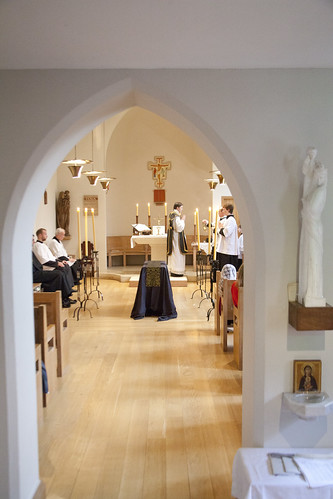 |
| A Traditional Requiem Mass in the chapel of St Benet's Hall, Oxford, in 2015. On the right the small statue is a scale model of 'Our Lady of Isles', a huge statue constructed on Catholic South Uist in the Hebrides in 1958. The model is I believe a working model made by the artist, Hew Lorimer. |
I've been reading about the Church in the Scottish Highlands and Islands. Here is something worth sharing. Fr Allan MacDonald, Parish Priest in the Scottish Hebrides in the late 19th century, was a Gaelic speaker and a great collector of folklore. I quote John Watts, the historian, referring to Fr MacDonald's notebooks (which have been postumously published, in part):
(I've discussed Brown's thesis in more detail here.)
Support the work of the LMS by becoming an 'Anniversary Supporter'.
Holy Trinity Hethe welcomes Fr Anthony Talbot
As of the beginning of January Fr Anthony Talbot has been celebrating the Traditional Mass in Holy Trinity, Hethe, outside Bicester (Hardwick Road, Hethe, OX27 8AW). After a period of having a rota of priests coming from different places it is good to have a single pastor again, in this beautiful historic church.
We are very grateful for the priests who between them covered the gap between Fr Paul Lester and Fr Talbot, while the Presbytery was being refurbished and was uninhabitable. This maintained the Sunday provision established by Fr Lester three years ago.
The Traditional Mass in Hethe is celebrated every Sunday at 12 noon. On the second and fourth Sundays of the month it is a Missa Cantata. We are also planning some occasional Masses with polyphony.
Support the work of the LMS by becoming an 'Anniversary Supporter'.


